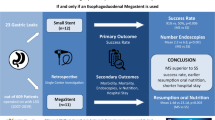Abstract
Background
Obesity today is a leading cause of global morbidity and mortality, and bariatric surgeries such as laparoscopic sleeve gastrectomy (LSG) are increasingly playing a key role in its management. Such operations, however, carry many difficult and sometimes fatal complications, including leaks. This study aims at evaluating the effectiveness of endoscopic stenting in treating gastric leaks post-LSG.
Methods
A retrospective study was conducted to the patients who were admitted with post-LSG gastric leak at Al-Amiri Hospital Kuwait from October 2008 to December 2012 and were subsequently treated with stenting. The patients were stented endoscopically with self-expandable metal stent (SEMS), and a self-expandable plastic stent (SEPS) was used to facilitate stent removal.
Results
A total of 17 patients with post-LSG leaks underwent endoscopic stenting. The median age was 34 years (range 19–56), 53 % of the patients were male, and mean body mass index (BMI) was 43 kg/m2. The median duration of SEMS placement per patient was 42 days (range 28–84). The SEPS-assisted retrieval process took a median duration of 11 days (range 14–35). Successful treatment of gastric leak was evident in 13 (76 %) patients, as evident by gastrografin swallow 1 week after stent removal. In addition, a shorter duration between the LSG and the time of stent placement was associated with a higher success rate of leak seal.
Conclusions
The use of SEMS appears to be a safe and effective method in the treatment of post-LSG leaks, with a success rate of 76 %. The time frame of intervention after surgery is critical, as earlier stent placement is associated with favorable outcomes. Finally, SEPS is often required to facilitate SEMS removal, and further modification of stents and its delivery system may improve results.
Similar content being viewed by others
References
World Health Organization. Obesity and overweight factsheet [WHO website]. March 2013. http://www.who.int/mediacentre/factsheets/fs311/en/index.html. Accessed 19 Oct 2013
World Health Organization. Regional Health Observatory. http://rho.emro.who.int/rhodata/?theme=country&vid=11#. Accessed 19 Oct 2013
World Health Organization. Obesity [WHO website].. http://www.emro.who.int/health-topics/obesity/. Accessed 19 Oct 2013
Sarkhosh K, Birch D, Sharma A, Karmali S (2013) Complications associated with laparoscopic sleeve gastrectomy for morbid obesity, a surgeon’s guide. Can J Surg 56(5):347–352
Adair J, Ellesmere J Complications of Bariatric Surgery [uptodate website] May 21, 2013. available at: http://www.uptodate.com/contents/complications-of-bariatric-surgery. Accessed 19 Oct 2013
Simon F, Siciliano I, Gillet B et al (2013) Gastric leak after laparoscopic sleeve gastrectomy: early covered self-expandable stent reduces healing time. Obes Surg 23:687–692
Jurowich C, Thalheimer A, Seyfried F et al (2011) Gastric leakage after sleeve gastrectomy-clinical presentation and therapeutic options. Langenbeck Arch Surg 396:981–987
Al-Sabah S, Ladouceur M, Christou N (2008) Anastomotic leaks after bariatric surgery: it is the host response that matters. Surg Obes Relat Dis 4(2):152–157
Puli S, Spofford I, Thompson C (2012) Use of self-expandable stents in the treatment of bariatric surgery leaks: a systematic review and meta-analysis. Gastrointest Endosc 75:287–293
Pequignot A, Fuks D, Verhaeghe P et al (2012) Is there a place for pigtail drains in the management of gastric leaks after laparoscopic sleeve gastrectomy? Obes Surg 22:712–720
Elsendrath P, Cremer M, Himpens J et al (2007) Endotherapy including temporary stenting of fistulas of the upper gastrointestinal tract after laparoscopic bariatric surgery. Endoscopy 39:625–630
Aretxabala X, Leon J, Weidmaier G et al (2011) Gastric leak after sleeve gastrectomy: analysis of its management. Obes Surg 21:1232–1237
Corona M, Zini C, Allegritti M et al (2013) Minimally invasive treatment of gastric leak after sleeve gastrectomy. Radiol Med 118:962–970
Acknowledgments
The authors would like to thank all who have contributed in making this study possible.
Disclosures
The authors Waleed Al-Azmi, Salman Al-Sabah, Daliya AlMohammad Ali, and Sulaiman Almazeedi declare no conflicts of interest or financial ties to disclose.
Author information
Authors and Affiliations
Corresponding author
Rights and permissions
About this article
Cite this article
Alazmi, W., Al-Sabah, S., Ali, D.A. et al. Treating sleeve gastrectomy leak with endoscopic stenting: the kuwaiti experience and review of recent literature. Surg Endosc 28, 3425–3428 (2014). https://doi.org/10.1007/s00464-014-3616-5
Received:
Accepted:
Published:
Issue Date:
DOI: https://doi.org/10.1007/s00464-014-3616-5




